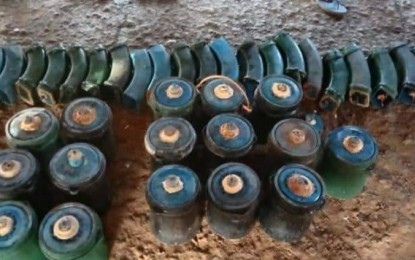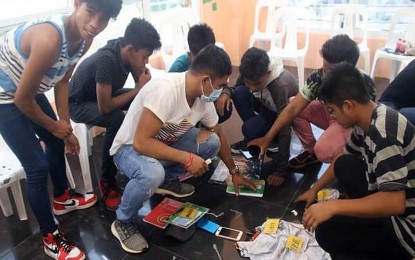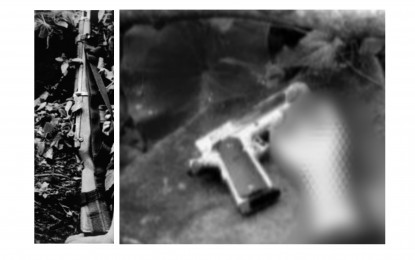From the Philippine News Agency (Jul 14, 2022): CHR urged to probe NPA’s frequent use of banned mines in Samar (By Sarwell Meniano)

BANNED. Some anti-personnel mines turned over by a former rebel to the Philippine Army in Borongan City, Eastern Samar on June 3, 2022. The Philippine Army has formally asked the Commission on Human Rights 8 (Eastern Visayas) to investigate the frequent use of internationally banned anti-personnel mines by the New People’s Army in the Samar provinces. (Photo courtesy of Philippine Army)
The Philippine Army has formally asked the Commission on Human Rights (CHR) 8 (Eastern Visayas) to investigate the frequent use of internationally banned anti-personnel mines (APMs) by the New People’s Army (NPA) in the Samar provinces.
In a letter, the commander of the Philippine Army’s 8th Infantry Division, Maj. Gen. Edgardo de Leon, told CHR-8 Director Desiree Pontejos that the NPA consistently ignores the International Humanitarian Law.
“The 8th Infantry Division respectfully requests the CHR to faithfully execute its mandate to uphold the respect of Human Rights primarily and International Humanitarian Law corollary and to conduct an investigation on the culpability of the National Democratic Front (NDF) of the Philippines leadership as Responsible Superior for the continuing blatant violation of the International Humanitarian Law and Ottawa Conventions,” de Leon said.
The letter, dated July 12, 2022 and was shared with the Philippine News Agency (PNA) on Thursday, asserts that the NDF is fully aware that its armed wing, the NPA, has been manufacturing, stockpiling, transporting, and using the banned explosives.
De Leon sent the letter just a week after NPA members detonated anti-personnel mines laid along the community trail of Magsaysay village in Mapanas, Northern Samar on July 5, wounding seven soldiers belonging to the community support program team.
He said the July 8 statement of Marco Valbuena, who introduced himself as chief information officer of the Communist Party of the Philippines (CPP), is an admission that the NPA was behind the July 5 blast.
Valbuena claimed the government troops were hit by an NPA unit, referring to the APM explosion, according to de Leon.
De Leon also cited four other incidents where the NPA used anti-personnel mines to attack government forces in the Samar provinces.
On April 3, two policemen were killed and four troopers were hurt when the NPA detonated APMs along the road in San Miguel village, Las Navas, Northern Samar.
On January 25, a similar incident in Pinabacdao, Samar injured a soldier and a militiaman.
The use of banned explosives by rebels killed a soldier and two militiamen and wounded other troopers in Jipapad, Eastern Samar on July 7, 2021.
The bloodiest was on Dec. 1, 2019, when NPA-planted mines exploded along a highway in Borongan City in Eastern Samar, killing a policeman and a civilian. The incident also injured four police officers and 12 civilians, including three children.
“The NPA continues to manufacture, stockpile, transport, and use APMs as evident on the recent incidents and as revealed by former civilian sympathizers who turned in a big number of this internationally banned mine. They revealed that the APMs were entrusted to them by NPA fighters,” de Leon wrote in his letter.
The use of APMs violates the Ottawa Treaty, International Humanitarian Law, and Republic Act 9851 or the “Philippine Act on Crimes Against International Humanitarian Law, Genocide, and Other Crimes Against Humanity."
The CPP-NPA is listed as a terrorist organization by the United States, the European Union, the United Kingdom, Australia, Canada, New Zealand, and the Philippines.
The Anti-Terrorism Council also formally designated the NDF as a terrorist organization on June 23, 2021, citing it as “an integral and inseparable part” of the CPP-NPA created in April 1973.
https://www.pna.gov.ph/articles/1178921





